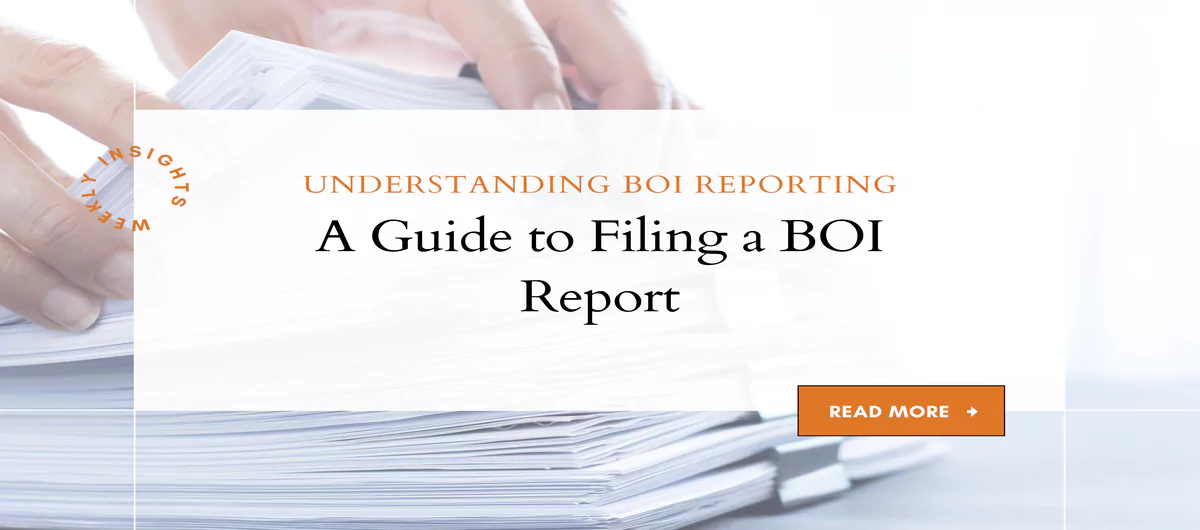August 15 2024 | By Wajiha Danish | 8 minutes Read

What is BOI Reporting?
The Importance of BOI Reports
Who is Required to File a BOI Report?
Exemptions from BOI Reporting
What Information is Required in a BOI Report?
The Process of Filing a BOI Report
1. Determine Reporting Requirements
2. Gather Beneficial Ownership Information
3. Complete the BOI Report Form
4. Submit the BOI Report
5. Maintain Records
Implications of Non-Compliance
Best Practices for BOI Reporting
1. Implementing a Compliance Program
2. Designating a Compliance Officer
3. Regular Training and Education
4. Utilizing Technology
5. Conducting Regular Audits
Final Thoughts
Corporate governance and compliance can get confusing quite fast. Often, the tasks that are the most critical might often be overlooked. One such task is BOI reporting, which stands for Beneficial Ownership Information reporting.
This refers to the details that companies must report regarding the individuals who ultimately own or control the organization. This blog walks you through the BOI reporting process, and highlights the importance of filing a BOI report, and the implications of failing to comply with these requirements.
BOI reporting is a regulatory requirement designed to increase transparency in corporate ownership. The primary purpose of these reports is to prevent the misuse of legal entities for illicit activities, such as money laundering, terrorist financing, and tax evasion.
By requiring companies to disclose information about their beneficial owners, governments aim to create a clear trail of ownership that can be monitored and audited as needed.

The significance of BOI reports lies in their ability to promote transparency and accountability within the corporate sector. When companies disclose their beneficial ownership information, it becomes easier for regulators to track down the individuals who truly control these entities.
This transparency is crucial in the fight against financial crimes, as it helps ensure individuals are unable to hide behind complex corporate structures to engage in illegal activities.
Furthermore, BOI reporting helps level the playing field in the business world. By making ownership information publicly available, it becomes harder for certain entities to gain unfair advantages through undisclosed relationships or conflicts of interest. This leads to a more competitive and fair market environment, which benefits businesses and consumers alike.
Here’s a fact sheet that might help you make sense of the process.
Not all companies are required to file a BOI report. The specific requirements vary by jurisdiction, but generally, the following types of entities may be required to submit these reports:
Certain entities may be exempt from BOI reporting requirements. These exemptions vary by jurisdiction but may include:
Companies must understand whether they fall under the BOI reporting requirements in their specific jurisdiction to avoid non-compliance.
A BOI report typically requires detailed information about the individuals who are considered beneficial owners of the entity. While the exact details required may vary by jurisdiction, the following information is commonly requested:

Filing a BOI report is a straightforward process, but it requires careful attention to detail to ensure compliance. The process generally involves the following steps:
The first step in filing a BOI report is to determine whether your company is required to submit one. This involves understanding the regulations in your jurisdiction and identifying whether your entity falls within the scope of BOI reporting requirements.
Once it is determined that a BOI report is required, the next step is to gather the necessary information about the beneficial owners of the entity. This may involve reaching out to shareholders, members, or other individuals who have a significant ownership or control interest in the company.
Most jurisdictions provide a standardized form or template that companies must use to file their BOI reports. This form will require the information gathered in the previous step to be entered accurately and completely. It is important to double-check all entries to avoid errors that could lead to non-compliance.
After the form is completed, it must be submitted to the appropriate regulatory authority. This is often done electronically, although some jurisdictions may still require paper submissions. The submission process may also involve paying a filing fee, depending on local regulations.
Even after the BOI report is filed, it is essential to maintain records of the information submitted. This includes keeping copies of the report and any supporting documents. In some jurisdictions, companies may be required to update their BOI reports periodically, so maintaining accurate records is crucial for future compliance.
Failing to comply with BOI reporting requirements can have serious consequences for a company and its beneficial owners. The penalties for non-compliance vary by jurisdiction but may include:
To ensure compliance with BOI reporting requirements, companies should adopt best practices that make the reporting process simpler and reduce the probability of errors. Some of these best practices include:
Companies should establish a strong compliance program that includes BOI reporting as the main player. This program should outline the procedures for gathering beneficial ownership information, completing the report, and submitting it on time.
Appointing a dedicated compliance officer can help ensure that BOI reporting requirements are met. This individual should be responsible for overseeing the reporting process, maintaining records, and staying informed about any changes to local regulations.
Regular training sessions for employees and management can help keep everyone informed about BOI reporting requirements and the importance of compliance. This training should cover the steps involved in filing a BOI report, the potential consequences of non-compliance, and any updates to the regulations.
There are various software solutions available that can assist with BOI reporting. These tools can help automate the process of gathering beneficial ownership information, filling out forms, and submitting reports. By leveraging technology, companies can reduce the likelihood of errors and ensure that reports are filed on time.
Regular audits of BOI reporting processes can help identify any weaknesses or areas for improvement. By conducting these audits, companies can address potential issues before they lead to non-compliance.

BOI reporting is an extremely important aspect of corporate governance that plays a huge role in promoting transparency, preventing financial crimes, and ensuring a fair business environment.
While the process of filing a BOI report may seem daunting, following the steps outlined in this guide can help companies navigate the requirements with confidence. Plus, if you don’t have the time required to fill out those forms, you can always hire a professional to help!
By understanding the importance of BOI reports, identifying the necessary information, and adopting best practices for compliance, companies can avoid the serious consequences of non-compliance and contribute to a more accountable corporate landscape.
As regulations continue to evolve, staying informed and proactive in BOI reporting will be essential for any business looking to thrive in today’s complex regulatory environment. Are you ready to grow? Contact us today!
Subscribe for business tips, tax updates, financial fundamentals and more.
MORE BLOGS

Running a SaaS business can look simple from the outside. Customers sign up, pay monthly or yearly, and keep using the product. Quite straightforward, right? Behind […]
Learn More →
Revenue is the heartbeat of any SaaS business. But how and when that revenue shows up on your books can change everything, from investor confidence to […]
Learn More →
If you’re a small business, we will absolutely get it if you say you’re having a hard time choosing a payment platform for your company. And […]
Learn More →